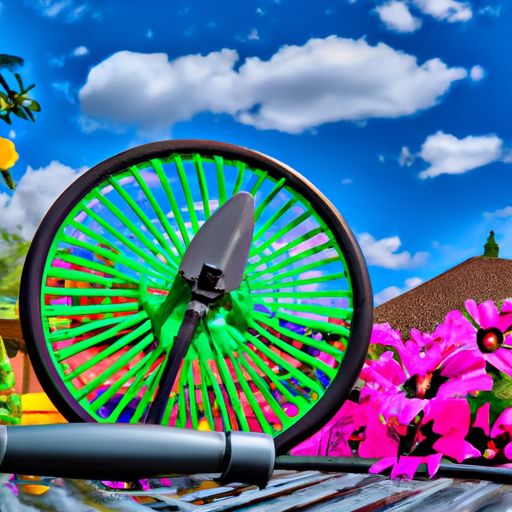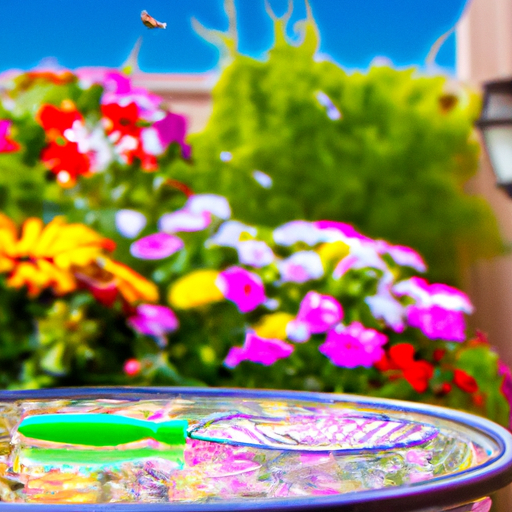Are you tired of dealing with pesky flies buzzing around when you’re trying to enjoy the great outdoors? Well, fret no more! Here are some effective methods to help you get rid of those bothersome flies and reclaim your outdoor space.
One of the simplest ways to combat flies outdoors is by setting up fly traps. These traps can be hung or placed strategically around your patio or garden, and they work by attracting flies with a combination of bait and sticky surfaces. Alternatively, you can try using flypaper, which is coated with a sticky substance that flies can’t resist. Another effective option is using fly repellent sprays or citronella candles to create a barrier against these winged intruders. Additionally, keeping your outdoor area clean and free from any food remnants or garbage can deter flies from gathering around. Finally, consider using outdoor fans to create a constant breeze, as flies aren’t fond of strong air currents. With these tips in mind, you’ll soon be able to enjoy your outdoor space without any pesky flies buzzing around.
Remember, implementing a combination of these methods is often more effective than relying on a single solution. So give them a try and say goodbye to those annoying flies outdoors.
Effective Ways to Get Rid of Flies Outdoors
Are you tired of annoying flies ruining your outdoor activities and picnics? If so, fret not! We have compiled a comprehensive guide on effective ways to rid yourself of these pesky pests. From practicing cleanliness and maintenance to implementing physical barriers, modifying outdoor lighting, using homemade traps, and relying on fly repellent products, we’ve got you covered! Let’s dive into these tried and tested methods to help you enjoy your time outdoors without any unwanted buzzing companions.
Cleanliness and Maintenance
Keeping your outdoor spaces clean and well-maintained is the first step towards eliminating flies. Flies are attracted to garbage, waste, and even pet areas, so taking measures to mitigate these attractions is crucial.
Regular Garbage Disposal
Ensure regular removal of garbage from your outdoor areas. Invest in sealed trash cans with lids to prevent flies from accessing the discarded food and waste.
Proper Waste Management
Dispose of any organic waste properly. If you have a compost bin, make sure it is tightly closed and located away from your outdoor living spaces. Flies are drawn to decomposing organic matter, so diligent waste management is key.
Cleaning Pet Areas
If you have pets, make a habit of cleaning their outdoor living spaces regularly. Dispose of any animal waste promptly and ensure the area is kept clean and free from any leftover food or standing water.
Eliminating Standing Water
Flies breed and thrive near standing water, so it’s essential to eliminate any stagnant water sources in your outdoor environment. Regularly empty and clean birdbaths, pet water bowls, and any other containers that may accumulate water. Keep gutters clean to avoid water accumulation and potential breeding sites for flies.
Natural Fly Repellents
Harnessing the power of nature can be an effective way to deter flies from your outdoor spaces. Here are some natural fly repellent methods you can try:
Planting Insect-Repelling Herbs
Utilize the natural ability of certain herbs to repel flies. Planting herbs like basil, mint, lavender, and rosemary can discourage flies from invading your outdoor spaces. Not only do these herbs add a pleasant aroma to your surroundings, but they also act as a natural deterrent for flies.
Using Citronella Candles or Torches
Citronella is a well-known natural repellent for various insects, including flies. Light up citronella candles or torches in your outdoor areas to create an invisible barrier that flies find unpleasant. Citronella-based products are widely available and can significantly decrease fly activity in your outdoor spaces.
Hanging Fly Traps
Consider using hanging fly traps in strategic locations throughout your outdoor spaces. These traps are designed to attract flies and capture them, reducing their population in the area. Opt for non-toxic traps that harness the power of attractants like pheromones to lure flies without employing harmful chemicals.
Creating DIY Fly Repellent Sprays
If you prefer a DIY approach, you can create your own fly repellent sprays using natural ingredients. Simple recipes that include essential oils like lemongrass, eucalyptus, or peppermint mixed with water can be sprayed in targeted areas to repel flies effectively. Be sure to reapply the spray every few hours for optimal results.
Attracting Natural Predators
Nature provides us with certain allies in our fight against flies. Attracting natural predators like birds, bats, or dragonflies to your outdoor spaces can help keep the fly population in check. Creating a bird-friendly environment, providing bat houses, or incorporating water features that attract dragonflies can contribute to a natural balance and reduced fly activity.

Implementing Physical Barriers
In addition to cleanliness and natural repellents, implementing physical barriers can further prevent flies from bothering you and your outdoor gatherings. Let’s explore a few options below:
Installing Window Screens
To keep flies out of your home, installing window screens is a must. Not only do window screens serve as a protective barrier against mosquitoes and other flying insects, but they also effectively block flies from entering your living spaces. Ensure screens are properly fitted and in good repair to maximize their effectiveness.
Using Fly Swatters or Fly Paper
Old-fashioned, yet highly effective, fly swatters are a handy tool to have on hand. Keep a fly swatter nearby when you’re spending time outdoors and use it to swiftly eliminate any pesky flies that come too close for comfort. Alternatively, you can hang sticky fly paper strips in strategic areas to trap flies and reduce their presence.
Applying Mesh Screens to Outdoor Dining Areas
If you have an outdoor dining area or patio, consider applying mesh screens to enclose the space. This creates a physical barrier between you and the flies, allowing you to enjoy your meals in peace without the constant annoyance of buzzing insects. Mesh screens are readily available in various sizes and can be easily attached to existing structures.
Using Nylon or Wire Mesh Coverings
For areas requiring temporary fly protection, such as food preparation stations or outdoor bar areas, nylon or wire mesh coverings can be highly effective. They allow air circulation while preventing flies from accessing the food or drinks. Be sure to secure the coverings tightly to ensure flies cannot find their way inside.
Modifying Outdoor Lighting
Believe it or not, the type and positioning of outdoor lighting can impact the presence of flies. By making a few modifications, you can significantly reduce their attraction to your outdoor spaces.
Switching to Yellow Bug Lights
Yellow bug lights emit a softer, amber hue that is less attractive to flies and other flying insects. By replacing your regular outdoor lights with yellow bug lights, you can create an environment that is less appealing to flies. Not only will this reduce fly activity around your property, but it will also provide a warm and cozy ambiance.
Avoiding Bright Lights at Night
Flies are naturally drawn to bright lights, so it’s best to avoid excessive illumination during nighttime. Instead, opt for softer, dimmed lighting options to minimize fly attraction. By keeping outdoor spaces subtly lit, you can enjoy an intimate atmosphere while deterring flies from invading your outdoor gatherings.
Utilizing Motion-Activated Lights
Motion-activated lights can serve two purposes: increasing security and deterring flies. These lights activate when motion is detected, providing an added layer of safety for your outdoor spaces. Additionally, the sudden burst of light can startle and dissuade flies from lingering in the area, making it a win-win solution for both illumination and fly prevention.

Opting for Homemade Traps
Homemade traps can be a cost-effective and efficient way to catch and eliminate flies. Here are a few simple traps you can create yourself:
Apple Cider Vinegar Trap
Flies are attracted to the sweet scent of apple cider vinegar. To create a trap, fill a small bowl or jar with apple cider vinegar and cover it with plastic wrap. Poke a few holes in the plastic wrap to allow flies to enter. Once inside, they will become trapped in the liquid. Empty and replace the trap regularly to ensure maximum effectiveness.
Soda Bottle Trap
Transform an empty soda bottle into a fly-catching device by cutting off the top third of the bottle. Invert the removed section and place it back inside, creating a funnel-like entrance. Pour a mixture of sugar water or another sweet liquid into the bottom of the bottle and watch as flies are lured in but unable to escape.
Sticky Ribbon or Tape Trap
Hang up sticky fly ribbons or tape in areas where flies are particularly problematic. These adhesive traps are designed to capture flies when they come into contact with the sticky surface. Hang them near doors or windows, or even in trees near outdoor seating areas to intercept flies before they have a chance to bother you.
Milk and Sugar Trap
Mix equal parts of milk and sugar in a small bowl to create a fly attractant. Place the bowl outdoors, away from your living spaces, and watch as the mixture entices flies. As they gather around the bowl, cover it quickly with a plastic bag, securing it tightly. Dispose of the trapped flies and repeat the process as needed.

Using Fly Repellent Products
If you prefer a more direct approach, using fly repellent products can provide immediate relief from fly invasion. Consider the following options:
Bug Zappers
Bug zappers are electronic devices that emit ultraviolet light to attract flies and other flying insects. Upon contact, flies are electrocuted by a high-voltage grid. Place bug zappers strategically around your outdoor spaces to lure and eliminate flies. However, be mindful that bug zappers may also attract other beneficial insects, so use them with caution.
Electric Fly Swatters
Electric fly swatters are handheld devices that deliver a small electric shock on contact with flies. They are a convenient and effective tool for instantly dispatching flies buzzing in your vicinity. Keep in mind, though, that electric fly swatters should be handled with care and kept out of reach of children.
Fly Repellent Sprays
Commercially available fly repellent sprays can be a quick and hassle-free solution. Look for products containing natural ingredients like essential oils or those specifically formulated for outdoor use. Apply them to targeted areas or directly onto your skin for added protection against flies.
Ultrasonic Pest Repellers
Ultrasonic pest repellers emit high-frequency sound waves that are inaudible to humans but can repel a variety of pests, including flies. Plug them into electrical outlets near your outdoor spaces to create an environment that is unfriendly to flies. They offer a non-toxic and environmentally friendly alternative to traditional chemical-based repellents.
With these effective ways to get rid of flies outdoors, you can reclaim your enjoyment of outdoor activities and maintain a fly-free environment. Experiment with different methods and combinations until you find the ones that work best for you. By practicing cleanliness, utilizing natural repellents, implementing physical barriers, modifying outdoor lighting, using homemade traps, and relying on fly repellent products, you’ll be well on your way to a fly-free outdoor space. So, gear up and bid farewell to those pesky flies!






